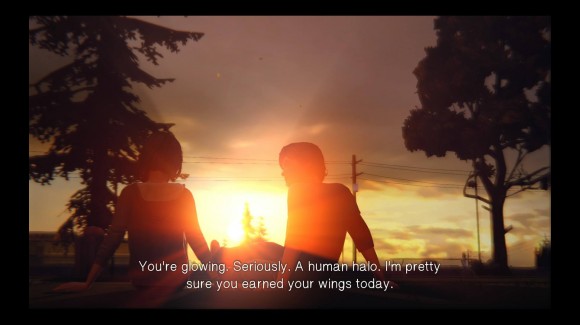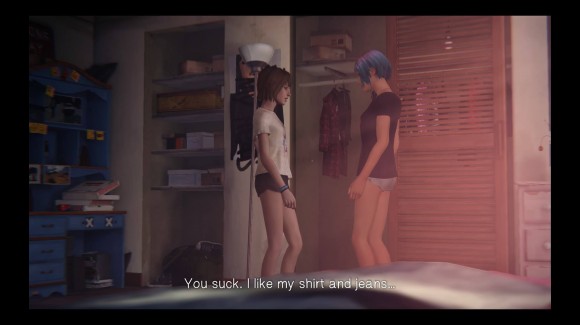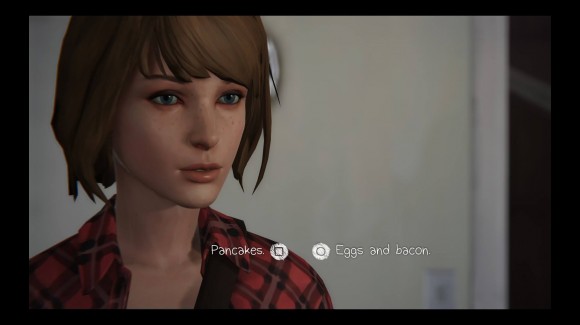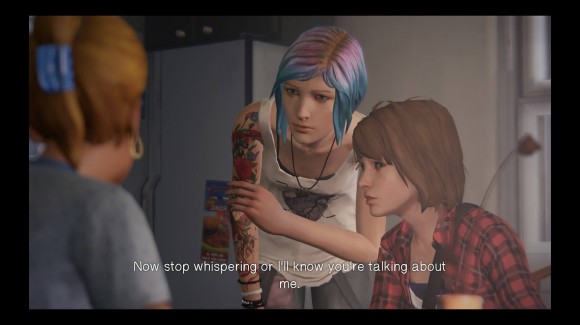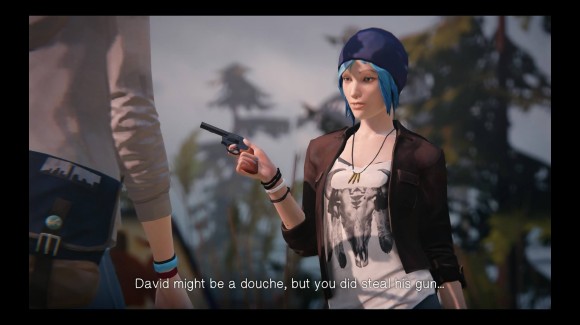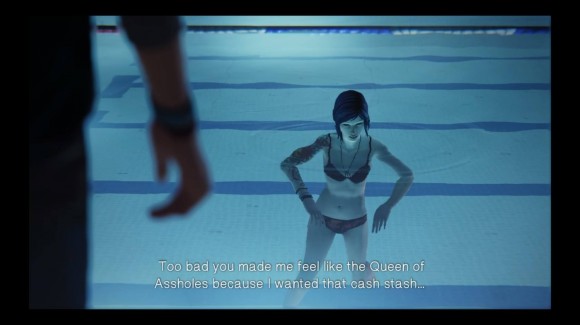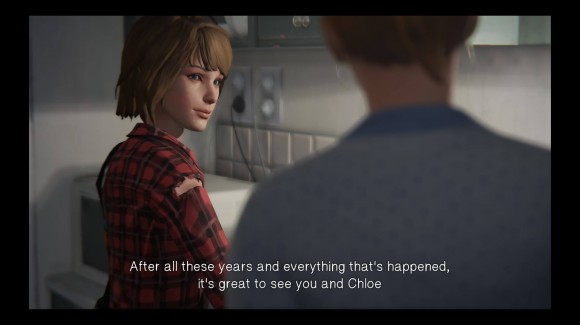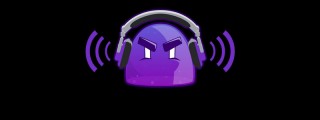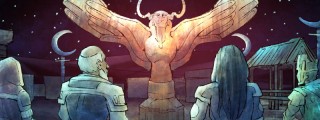When Life is Strange episode 2 officially landed, I had folks telling me left and right it was a huge improvement over Dontnod’s pilot installment. Since I was originally excited over the concept of Life is Strange, and wanted to like the first episode much more than I actually did, I was naturally looking forward to it. Now this being Enemy Slime we are contrarian to everything, and as it turns out I think Episode 2 is even worse than the first. 3? Eh it’s alright.
So credit where credit is due. Several of the voice actors seem much more comfortable with their characters than in the first episode. This is especially good in the case of their odd bible thumping Goth chick Kate, who is a major focus in episode 2. In the first one her voice actor played her very stale and cliche goth. In this one she sounds, ya know, like a human being. The episode seems to have also been written, or I’m guessing rewritten in response to wide spread and agreed upon criticism of the first’s language abuse, so that there are far less instances of slang used by the characters. Sometimes you’ll get a ridiculous utterance such as “By Neptunes Beard”, but those were thankfully far and few between.
So. A refresher on the story: (spoilers ahead) Everygirl Max Caufield has just suffered the strangest day of her life. The new girl in school, she finds herself with the ability to manipulate time on the very same day she reunites with her bestie Chloe, whom she hasn’t seen in years. Over the course of her day Max has to put up with mentally unstable bullies, friends going through traumatic crises that would make Days of our Lives blush, and bearing witness to freak meteorological happenings threatening to destroy her small town.
Life is Strange takes its queues from TellTale adventure games in making sure each decision has consequences later in the game. Dontnod only partially did their homework here. While TellTale titles truly are a “choose your own adventure” and are plotted out so that the player can basically play any way they choose, with consequences that equally reflect their actions, Life is Strange has gotten increasingly black and white with its story decisions. For example, in Game of Thrones I might make a choice that pisses off character X but pleases character Y, Life is Strange has a nasty habit of making choices that constantly piss off both character X and Y. It’s not fun and it rips away even the illusion of choice the game might be trying to build, because being scolded like a puppy makes it painfully obvious when I did good and when I did bad.
This goes along with my criticisms of the first episode. I stated in my first overview how the game would try and make you feel bad about any choice you made. Well Episode 2 does it to the point of nagging. Seriously, characters will yell at you, you’ll get threatening texts, witness the property destruction of your digital belongings, even Max will keep reminding you “Hey, kid, you fucked up.” There’s “suffering consequence” and then feeling like you’re being kicked in the metaphorical ribs. After one point you just want the game to back the fuck off, and you regret doing anything at all.
The game continues to try and copy the strokes of an indie teen film. We even get a reflective moment of Max riding alone in a school bus as the town passes her by and alternative rock music plays. The problem here is such moments of introspection are usually reserved for letting the protagonist catch their breath after something harrowing or life changing has happened, to give us a deeper look at the character in their quiet moments. What it’s not for is wasting the viewer’s time with a useless scene transition. This is what happens when you craft a soulless homunculus based on formulas you don’t understand.
In fact, “just guessing” at things is where this game falls apart often. It feels like a French studio guessing at American lifestyles, and it feels like a video game dev guessing at auteur cinema and worst of all, it feels like armchair activists guessing at social issues. All the story problems could have been averted with maybe a bit more research and care in crafting the title.
There’s a lot going on in the story that gives the game its social awareness. The major antagonist is your quintessential unstable rich boy, his parents own the town and the kid for all his drug-dealing-woman-abusing-trespassing-verbal-threat-making-vandalizing-gun-waving ways is untouchable. The game touches on global warming and first world economies gone south. There are hints of LGBTQ issues and teen pregnancy and suicide and as of episode 3, maybe even disability. All of these are noble topics to want to explore and break down and raise awareness around, but it gives Life is Strange a disease I call TMS. Too Much Story. Rather than trying to save the world by covering so many social issues at once, it’s better to focus in on one or two so we can have a serious, thoughtful study of it and really break down why it’s a problem. Right now Life is Strange is overreaching.
But what about the actual story? Let’s leave behind the themes and smaller plot points for a second. There are three or four major thru-lines. The first are Max’s powers and getting a grip on them, which for lack of a better way to describe this, boil down to a superhero training montage complete with sidekick and secret lair. There are the freak weather and other natural occurrences really beyond your control at this point. There’s your friend Chloe, her ability to get in over her head and her Lemming like lifespan.
My biggest problem with the narrative however is Dontnod’s habit of covering dark, controversial themes but only doing it in a very After School special manner. It will introduce fucked up, concerning concepts without really exploring or even talking about said concepts. One example is the heavy implicated use of illegal substances and date rape drugs in Dontnod’s narrative. While you can successfully bring up a disconcerting topic and not show it, you can’t bring it up and then try and avoid talking about it. Dontnod finds a way to soften its own blows, they’ll introduce a scenario where they say “this character was forced into making a sex tape” and then change it to “well not not really, she was caught on video making out with a couple of guys” or “this person is a drug addict” turns into “this person smoked weed on occasion.” It deflates the dramatic narrative they were trying to build and does a disservice to not only their characters, but real and serious topics. It would have been better if they remained vague on their scenarios, or if they decided to not explore it altogether. As a story teller you either go for it or don’t cover it at all.
If only the story just fell apart at deflating its own tires however. Aside from robbing their story and characters of their own agency, they also like to rob the player of their agency. There are instances where, for all your player actions and manipulations leading up to an event, you only get to act on one linear route when events finally crescendo. There is a very eyebrow raising part at the end of episode 3 that makes every single choice made in the series feel irrelevant. I hope Dontnod has a clever trick up their sleeve, a way of reverting the state of the game, because right now it feels lousy that I had no impact on a game about choice.
So why does this all matter? Why does this make it a poor game? That’s simple. It’s so story driven, and presents itself so much as a game settled in reality with real stakes (outside of the whole ‘time travel’ thing) that I need to process it as near true to life. It is magical realism that asks me to buy that this could actually be happening in Small City USA. But if the writers can’t do the simple work of natural dialogue, researching the way the town they’re portraying actually lives and breathes, of making me invested, of making me suspend my disbelief, then I have no reason to care.
Episode 1 conditioned me to consider Max’s unique, reality breaking gift of time travel as both secondary and mostly useless. Glad to report nothing has changed here. But the puzzles. Jesus the puzzles. I didn’t know it was possible to make time travel painful and boring. A lot of the “puzzles” in Life is Strange boil down to watching an event transpire, memorizing some silly bit of information, then rewinding to apply it and get a leg up in conversation, or in one case shooting bottles and making sure Chloe doesn’t shoot herself. Because you know that’s what she does. She dies. A lot. Playing a complicated version of Simon isn’t a puzzle and it isn’t gameplay, it’s testing your ability to memorize then hit a button.
You might think I completely hate the title at this point. Not quite. Each episode has introduced at least one, truly epic moment that makes it feel like Max’s time travel powers matter. There’s a tornado sequence in the first episode, a train sequence in the second, and in the third well… Probably too large a spoiler to mention it. These sequences generally feel like a literal race against time, a manipulation of reality to truly impact the future and alter the timeline. Episode 3 also does honestly have some nice character exchanges and character development. Without spoiling too much there’s a certain “dare” I really enjoyed, and Max’s relationships finally felt like they were making progress. For a time anyway.
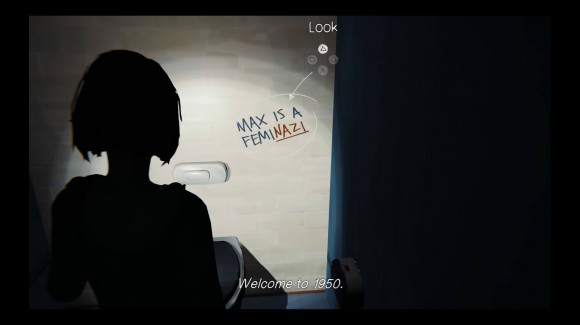
There’s actually little story context here, it’s just an insult Dontnod saw on the internet and decided to regurgitate.
I want to like Life is Strange, I really do. I love small town stories. I love coming of age stories. I love adventure games, especially ones that follow the TellTale formula. It’s got a crazy good hook in the form of time travel. I appreciate the desire to explore social topics in art. I think female driven stories are necessary. I even love shameless pop culture references, All of the ingredients used in Life is Strange are great, Dontnod however doesn’t seem a strong enough cook to make it taste good. Right now the remaining episodes really have to streamline and do something mind blowing to get me back (and I don’t mean shaking up the story to the point my choices feel irrelevant, like episode 3), but in a market currently saturated with offerings from bigger adventure game titans such as Double Fine and Telltale I would start there before giving Dontnod’s Life is Strange a second glance.

